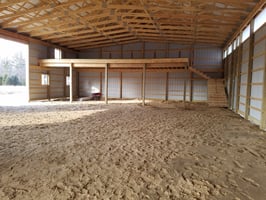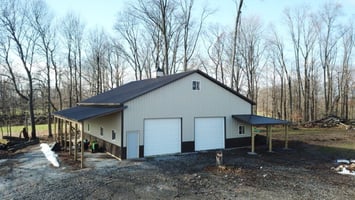Time to break ground! Site prep can be defined as the process of getting the land ready before the...
How Do I Winterize My Livestock Barn?
The coldest months are fast approaching, and if you haven’t made any preparations into winterizing your barn, its time to start. Completing a checklist for your outdoor post frame structure can save you time and money in the long run, as physical and financial problems tend to compound themselves if left unprepared for winter.
.png?width=483&height=253&name=Blog%20Images%20(1).png) Milmar offers commercial, residential and agricultural pole barns custom-designed to fit our client’s needs. Beyond building a functional structure the right way from the start, keeping your barn prepared to endure the harshest months is just as important as building it right in the first place.
Milmar offers commercial, residential and agricultural pole barns custom-designed to fit our client’s needs. Beyond building a functional structure the right way from the start, keeping your barn prepared to endure the harshest months is just as important as building it right in the first place.
Here are a few tips to keep your barn in best condition at the start:
Clean your barn
Sweep and wash the floors, making sure you eradicate the place of old excrement. Excess debris prevents a greater risk for fires, which makes maintaining a tidy floor essential.
Electricity and Heating
Preventing and avoiding a catastrophe is critical for your livestock and barn. A well-built structure is one with secure electrical wiring, safe from pests and rodents. Make sure you have a functional fire extinguisher, working light bulbs and a healthy furnace with a new filter. All of these things must be in working order to keep your animals healthy and your space livable.
Structural Integrity
At this point, it’s wise to analyze your barn and see if it’s necessary to fix windows, doors, siding and fencing. A great way to lower your energy costs and store heat is to caulk any holes and add weather stripping. The Animal and Plant Health Inspection Service requires your barn to stay above 45 degrees in the wintertime, so add insulation if your repairs aren’t doing the trick. Your barn roof and gutters can make problems worse in the winter, so fix any leaks and remove debris from your rain gutters before it gets too cold!
Food and Water Preservation and heating
Stock up on supplies, check expiration dates and replace the hay. Having too many supplies during winter is a good thing! Animals aren’t able to be outside for too long, therefore grazing isn’t an option. Keeping open access to warm water is a requirement, as livestock body temperatures are higher when they aren’t drinking freezing cold water.
Check your ventilation
Like in the summertime, fresh air in your barn can prevent many respiratory illnesses caused by stagnant air. Taking precautions by closing inactive louvers and soffits that aren’t used for ventilation. But be careful, as too much air can cause cold air drafts.



